CTP Episode of the Day - 12.28.06 - The Unnatural
Today's Cherished Episode: The Unnatural (6x20)
Original Air Date: April 25, 1999
Written By: David Duchovny
Directed By: David Duchovny
A rabid baseball fan -- Fox Mulder -- makes a startling discovery: Something alien has infiltrated his beloved national pastime.
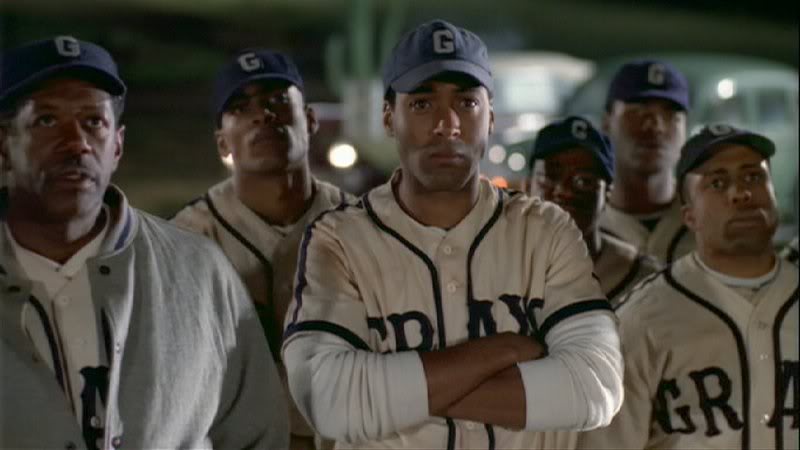
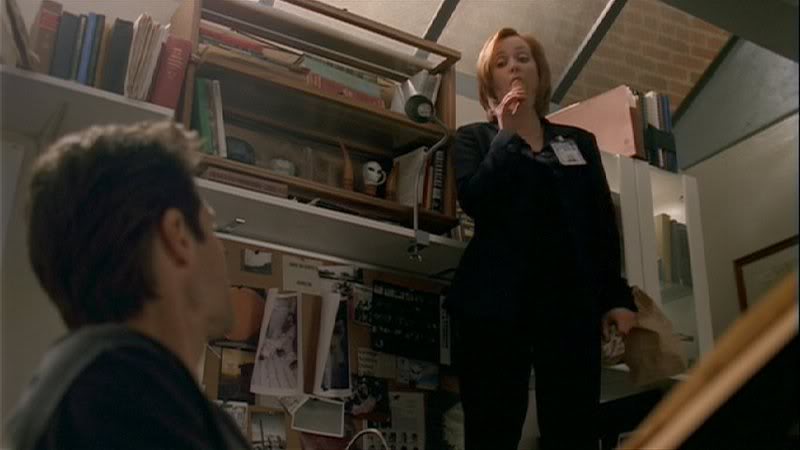
"Shut up, Mulder. I'm playing baseball."
-- In 2000, David Duchovny was asked who the best X-Files writers were. "The best -- Glen Morgan and Jim Wong, Glen’s brother Darin Morgan, Vince Gilligan -- set a tone and write a show that Chris wasn't able to do," he replied. "That’s not to denigrate Chris. But all writers, they can't do everything. Chris was able to write the real straight down the middle, good 'X-Files,' the ones that made the show a hit, the scary ones. Chris is real concerned with the boo and the scariness. Glen and Jim -- not having the responsibility of being show runners -- could take chances and write weird ones. And then Darin came, and he absolutely hated the show -- but in a good way, like I do. I think when I write for The X-Files, my hatred and love for it show at the same time."
Some "The Unnatural" Tidbits & Musings:
-- Title: The episode's title is a play on the common phrase used to describe someone born to do what they do, a "natural," as well as a play on The Natural, the acclaimed 1952 baseball novel by author Bernard Malamud (turned into a movie starring Robert Redford in 1984). The episode had several working titles before "The Unnatural" was chosen including "Black Sun," "Shades of Gray," and "Black Diamond."
-- Tagline change: "In the Big Inning."
-- From shortly after the Civil War to the early 1950's -- when Jackie Robinson and his successors bravely integrated Major League Baseball -- the United States was graced with a loose collection of players, teams, and leagues that are now categorized as Negro League Baseball. Largely ignored by the white press and public, the Negro Leagues were manned by extraordinarily talented African-American athletes, including black superstars such as Satchel Paige, Cool Papa Bell, Buck O'Neil, and Josh Gibson. Well-established teams like the Newark Eagles, Pittsburgh Crawfords, New York Black Yankees, and Homestead Grays battled against each other. They also barnstormed across the country, playing white and black squads made up of everyone from local farmhands to moonlighting white major league ballplayers.
-- In the past twenty-five years or so -- partly as a reaction to the increasing commercialization of professional sports -- there has been a revival of interest in the Negro leagues' history, and a sincere appreciation of how its players defied racism simply by playing the game they loved so well. The topic was frequently addressed by many contemporary sports writers, novelists, social commentators, documentarians, and screenwriters. Including David Duchovny.
-- David Duchovny originally became interested in screenwriting about 10 or 15 years prior to The X-Files, and his experience on the show got him thinking that he could make a contribution toward the show's storyline. In the second season, he shared story credit with Chris Carter on two episodes, "Colony" and "Anasazi," and later on "Avatar" and "Talitha Cumi."
-- Several more seasons went by before he began thinking about actually writing a script of his own. "I didn't have the surety, the confidence in my mind that I could write a teleplay," Duchovny said. "Writers and directors like to keep scriptwriting a very arcane enterprise so that dilettantes won't try to get involved and realize that it is actually just lightning and luck. If you have talent you can do it. Other than that, you can take all the McKee screenwriting courses that you want, but you're still not going to write a decent screenplay. I was 34, 35, and I thought, 'I'm never going to get it. I have decent ideas and I'll just pitch them to the writers.' It took me to the sixth year of the show to actually sit down and write one of my ideas. Being on The X-Files gave me a great advantage in knowing that I could pick that up really quickly. That's when I got focused on it. It was really a matter of realizing that I could do it."
-- In the fall of 1998 the X-Files star met with executive producer and series creator Chris Carter, and the two quickly agreed that Duchovny would write a late-season episode: his first solo writing job on this or any other series. Duchovny and Carter, both devoted baseball fans, had wanted to write an episode about baseball for several years, but had never been able to find the right story. Carter had suggested a story about an Indian burial ground under a baseball stadium, but that idea didn't pan out. When Duchovny reached the point where he felt he was ready to write, he kept searching for the right idea for a baseball story. One morning he was reading the newspaper -- much like Mulder was looking at a newspaper in the beginning of the episode -- and spotted an article about a minor-league player named Joe Bauman.
-- In 1954, Bauman, a gas station owner who had played for the now-defunct Roswell Rockets [as in Roswell, New Mexico -- the site of the 1947 "UFO crash" that kick-started America's obsession with the possibility of extraterrestrial visitors] in the long-forgotten Longhorn League, hit 72 home runs, and drove in 224 runs, for an overall slugging average of .916. "Bauman was like a Bull Durham character," Duchovny noted. "I don't think he ever made it to the majors, but I read this article during the McGwire-Sosa home run race, and it mentioned that Bauman had more than 70 home runs in a year in the minor leagues. And he played in Roswell, New Mexico, which I found hysterically funny. So I thought, 'What if this guy's an alien? He's hitting 70 home runs and he's an alien. There's my story -- we've got an alien baseball player.' I told my wife the idea and the next day I woke up and said to her, 'What if the guy's black and he's an alien and the reason he's black is because he doesn't want to go to the pros because he doesn't want to be discovered?' After that it just all fell into place."
-- "The weirdest thing was -- and it wasn't planned at all, just beautiful fictional serendipity -- the year that the UFO supposedly landed in Roswell was also the year that Jackie Robinson went to the majors. So I thought," added Duchovny with a wry smile, "'I am the genius, I have got my reins on the zeitgeist, I am the man!' The allegorical stuff about race and aliens easily laid into one another."
-- Exley's race also dictated the flashback structure of the episode. "Once Exley became black, the story wouldn't make any sense if it took place after the integration of baseball, because after integration he would be discovered, whether he wanted to or not," Duchovny said. "I liked the sense of loss that is part of the legacy of black ball players in this country. There were players whose names we don't know who were every bit as good as Babe Ruth and Lou Gehrig and all the names we do know. Josh Gibson was the prototypical Negro League ballplayer who never got a shot to prove to the world how good he was. So I liked this idea of an invisible history that we don't know. But this wasn't something I could do in a story set in the present."
-- As Duchovny's script took shape, mythological elements like the presence of the Alien Bounty Hunter were introduced; and, most importantly, retired FBI agent Athur Dales became a major protagonist of the story both as an idealistic young man and as a crusty-but-sentimental old codger, to be played as always by Darren McGavin. Duchovny brought back Dales because "it just made sense to me. Rather than have to create a whole new character and introduce him, I thought anytime you can use a character who has a history, you don't have to waste precious time telling the audience who he is and what he does. You get more time to tell the stuff that matters."
-- Duchovny wrote the script without input from the X-Files writing staff until he was ready to show them the first draft. "The satisfying thing about it was that I had no help at all," he said. "The mentoring was done through having five years of well-structured teleplays to guide me through. I wouldn't have known the teaser, four-act structure. That's not an intuitive thing to figure out. Above anything else, The X-Files was a really well-structured, story-telling mechanism. So I had that as my mentor. It's the most satisfying thing I've ever done."
-- "I'd love to say that I agonized over the writing process for this episode, but actually, it was really, really easy. I mean, I've tried to write before and I had never actually wrote anything that got done, so I know how hard it is and I know how agonizing it can be. But this was so easy. Either I had really gotten smart recently or this was an idea that was kind of perfect and fully formed from the get-go. So it was a joy. It was so much fun to write and I would just pray that all my experiences would be that way. I know they won't be. But there was very little rewriting except for budget constraints. Two days before I started shooting they said 'we've got to cut $300,000 out of it.' And I said, 'Well, then, I quit.'"
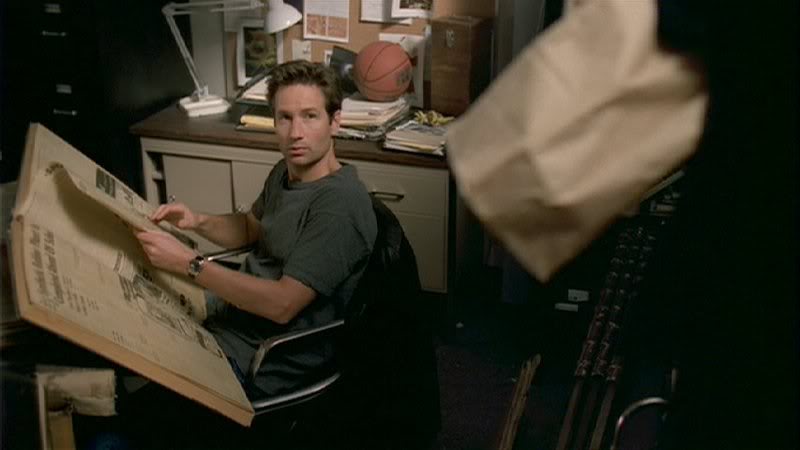
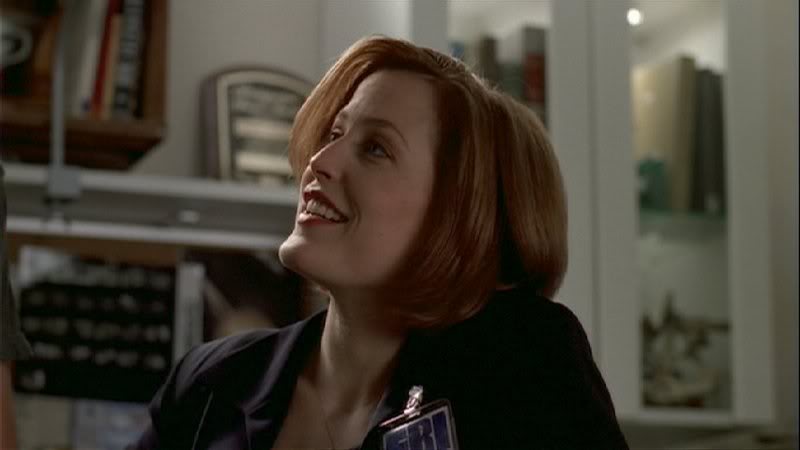
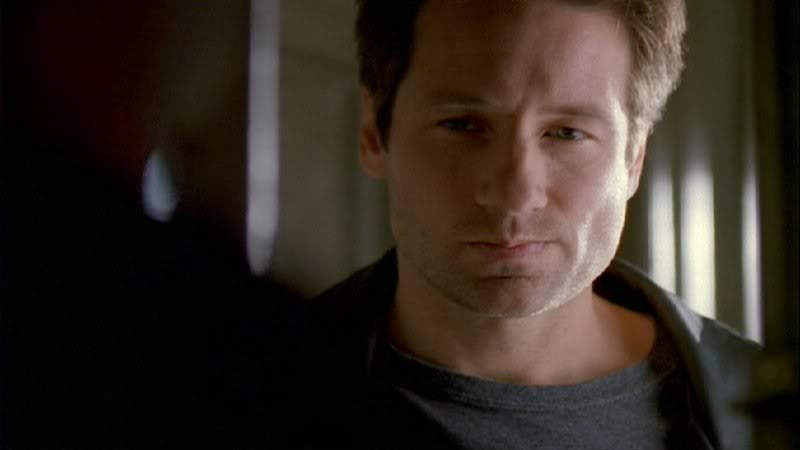
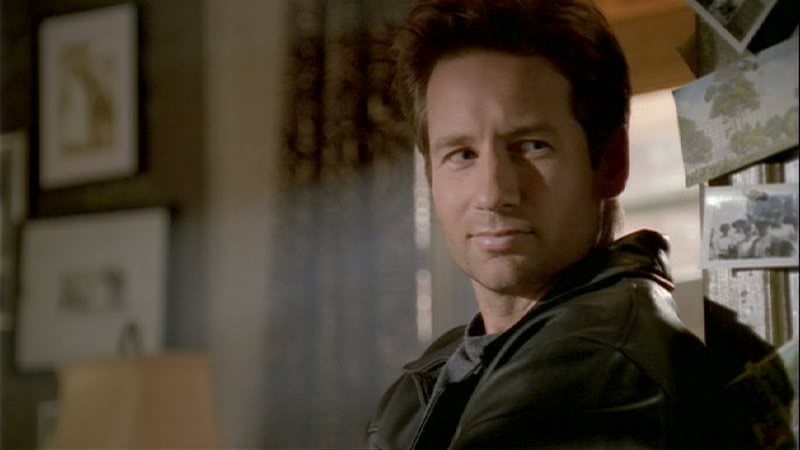
-- After he completely finished writing "The Unnatural" -- over the course of several months, with feedback from Chris Carter and Frank Spotnitz -- Duchovny decided to make the episode his directorial debut as well, which was fine with Chris Carter. "David wrote a great script," he said at the time. "And it's always better when you direct your own script if you've got the ability and the desire." The flashback story also lessened Mulder's presence in the episode, giving Duchovny time for pre-production and directing.
-- "David is an excellent writer," Chris Carter said. "That helps him both as an actor and as a director. He's a born storyteller. I only regret not having used his talents before."
-- When she heard that her co-star was going to write and direct an episode for the sixth season, Gillian Anderson joked, "I guess I will have to be careful to praise it and not find too much wrong with it. When the writer and director is also the co-star, that's a pretty powerful enemy to make!"
-- Duchovny's decision to direct "The Unnatural" grew out of his occasional frustration with the show's storyline and his lack of control over his character, something he acknowledged an actor "has to give up" in a television series. He saw directing as a way of protecting his script. "Directing is a part of the writing process. It's the completion of the writing and making sure that your vision gets carried through all the way. I guess I've been disappointed in the show's execution. It's a little like music. You can tell somebody this is how this should be and this is how it goes, and they nod, and you figure, 'We're on the same page, we're speaking the same language,' but it never works out that way. It doesn't. So you just go, 'For better or for worse, I'm going to be the guy that executes it all the way. I'm not going to leave it up to somebody else.'"
-- By mid-March of 1999, Duchovny -- whose wife, actress Téa Leoni, was seven months pregnant with their first child -- was well into the intensive work of preproduction. He had already made his major casting decision, choosing Jesse L. Martin to play Josh Exley, and had convinced the critically praised actor to squeeze the episode around his then-role as Calista Flockhart's love interest on the Fox series Ally McBeal.
-- "I had seen Jesse in Rent a few years before and he was great," recalled Duchovny. "And then I saw him on Ally McBeal and he just had the right feel for the character. The other major parts were cast because they were all recurring characters, so apart from Jesse, I didn't have that much to do with casting."
-- "I was confident in the script, but I had no idea what kind of director I was going to be," Duchovny recalled. "You never really know until you do it how specific it all is, or how much energy you need. I wasn't really sure about the work I had to do to prepare or what questions I had to ask." Nonetheless, he convinced much of the X-Files crew -- a bit apprehensive understandably, about working with their star in a vastly different capacity -- that they had nothing to fear on several important fronts.
-- "I had a great director of photography and a great first assistant director and a great script supervisor," Duchovny said. "And they all knew much more than I did about it, so they kept me in line."
-- "It was nice to see how truly humble he was," recalled locations manager Ilt Jones. "You know, I've worked with first-time directors before, and sometimes they try to bullshit you, to fake you into thinking that they know more than they actually do. Not David. Having been in the business, he obviously knew a lot about filmmaking, but he was never afraid to let on when he was doing something for the very first time."
-- "What was also interesting," added Jones, "was to see how truly sponge-like this guy was. I remember hearing him talk on the first day of the eight-day prep period, then again on the last day of the prep period, and realizing that there's been this radical metamorphosis into somebody who suddenly understood the dynamics of directing. He is clearly a very bright guy."
-- Unfortunately, Duchovny's intelligence and flexibility soon had to be brought to bear on a problem that proved to be the sixth season's saddest. After two days of filming his role as Arthur Dales, Darren McGavin suffered a stroke serious enough to prevent him from completing his role on the episode. While necessarily scrapping McGavin's footage (and replacing him with veteran character actor M. Emmet Walsh), the writer-director wrote new scenes for the "other" Arthur Dales, which in no way precluded McGavin's eventual return to The X-Files.
-- Duchovny was urged by the writing staff to change Dales into another character entirely and then have the new character tell the story of Dales to Mulder, but Duchovny resisted introducing a third person not directly involved in the situation. His solution was to make the character into the brother of the original Dales -- a brother with the same exact name. Veteran character actor M. Emmet Walsh came in to take over the role.
-- "It wouldn't have worked if Dales were telling the story about somebody else. That's why I couldn't let that happen and opened myself up to the ridicule of that stupid scene where the guy says he's got a brother by the same name," Duchovny said. "Fortunately it went by so quickly. The whole story fails if it's not this guy's primary experience. He can't be telling the story about somebody else, because he has to feel it, not just tell it about somebody else. That one-step removal would have taken away all the emotional immediacy of the piece."
-- Walsh's performance as the grumpy, hermit-like brother moved to tears by 50-year-old memories turned out to be one of the highlights of the episode. "It was intimidating because I was asking him to do so much so quickly," Duchovny recalled. "He came in the day after he got the script, and he had tons of what I thought would be fun dialogue if you had a couple of weeks with it, but he only had a day. I felt bad for him to come in and make the stuff work, because it was written kind of floridly. It's very hard to ask an actor to inhabit that way of speaking after a day, but Emmet was great. You somehow believe that he and Darrin McGavin could be brothers. They're both kind of cantankerous. Emmet made a mistake in the dialogue that I kept in because it was so funny. I think one his movies, My Best Friend's Wedding was in theaters then. He had a line in the script, 'I was chasing aliens while you were watching My Favorite Martian,' and he said, 'You were watching My Best Friend's Martian. That cracked me up."
-- The rest of the episode, happily, contained only the usual quota of improvisation and inspiration. The episode's major scenic casting coup was the rental of Littleton Ballfield, a jewel-like all-wood stadium in Ontario, California, to stand in for Roswell's baseball stadium. Located fifty miles east of Los Angeles, it was formerly known as Ontario Ball Park and was used in past years as a venue for semi-pro games and as the spring training home of the minor league Los Angeles Angels. It looked much the same as when it opened on March 14, 1937. To fill the stands with spectators, The X-Files advertised in local newspapers and on local radio stations for fans to come to their "baseball game" dressed in 1940s clothing.
-- "When they arrived we did a whole bunch of giveaways, and David gave autographs and mingled with the crowd," said Ilt Jones. "The first day was a little slow but on the second day there were mobs of people. It was great."
-- Fans who appeared as extras or watched the shooting of the final scene between Mulder and Scully on March 19, 1999, reported that David's wife Tea was on hand for some of the filming, despite the nasty weather (rain threatened or fell for most of that evening). They also noted that David took batting practice for quite a while before filming commenced, presumably to loosen up and look "natural" during the scene, and that Gillian Anderson even took a few solo swings in the batter's box to get the feel of the "nice piece of ash." Eyewitnesses also reported that a bit was filmed (but did not appear in the final episode) where Mulder was hit on the derriere by one of the pitched balls, and while he was yelping in pain, Scully asked, "Clarify something for me, Mulder. Are you actually supposed to hit the ball with your ass?"
-- To outfit all of the baseball teams in "The Unnatural" -- the 1940s were definitely the pre-double-knit era -- costume designer Christine Peters journeyed to Sports Robe, a specialized Hollywood costume house, and brought back numerous period designs to director Duchovny for his final selection.
-- To complete the on-field picture, hair department head Dena Green -- equipped with photographs of 1940s ballplayers to let the baseball-playing extras know exactly what they were getting into -- set up a Truman-era haircut assembly line outside the ballpark.
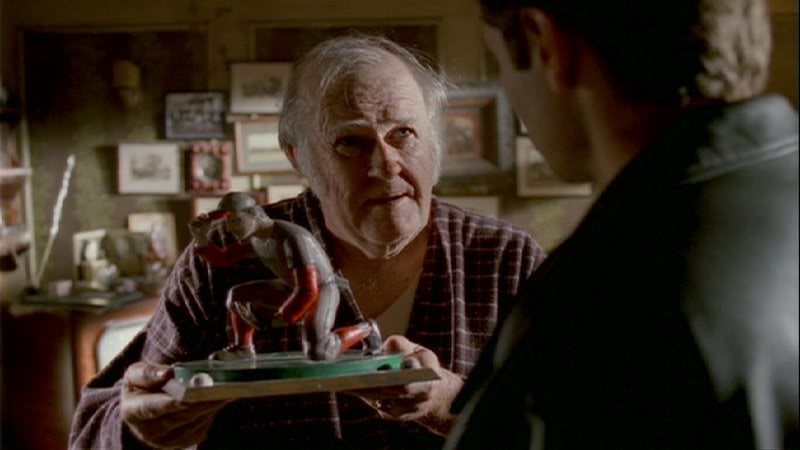
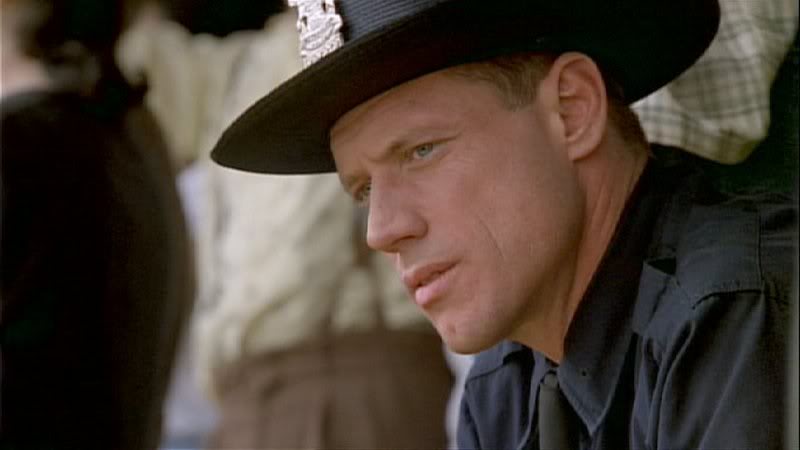

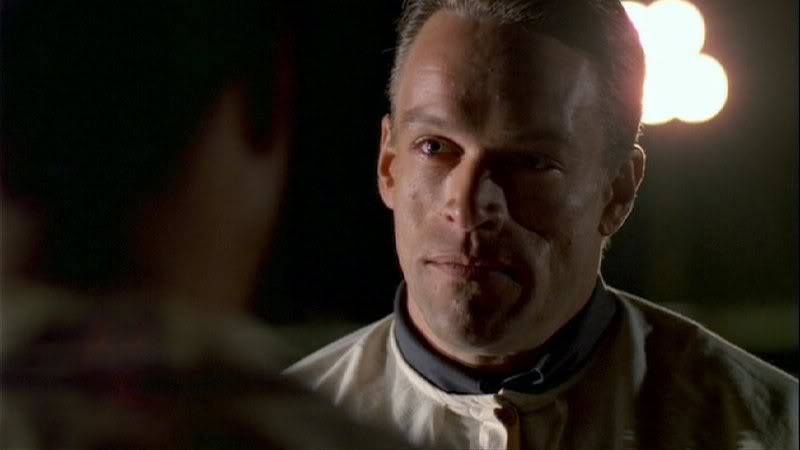
-- One of the "hurled clichés" at the beginning of the episode, "The road of excess leads to the palace of wisdom," is from a William Blake book, "The Marriage of Heaven and Hell."
-- The Coach's jersey identified his name as "Shiban," for producer John Shiban.
-- To provide the Roswell Grays with transportation, picture car coordinator Kelly Padovich rented two identical antique buses -- 1947 model Flexibles -- and used one (in the Grays' team colors and logo and with each hubcap painted to look like a baseball) for exterior shots and the other for interior filming. A number of 1930s and 1940s passenger autos were rented as well; Duchovny himself designed the Roswell police logo on the side of young Arthur Dales's squad car.
-- Coming up with a "Pete Rosebud" bank -- the cast-iron mechanical toy that old Arthur Dales showed proudly to Mulder -- proved surprisingly challenging to property master Tom Day. "I really don't know why," he said, "but nothing we saw in prop houses, on the antique market, or in reproduction catalogs came anything close to what we were looking for. Finally, I had to have an artist sculpt it, then get other people to mold it and pour it and paint it and rig it to work. I think it was actually one of the most expensive props we built the entire season. If not the most expensive."
-- To play Josh Exley in his alien incarnation, special effects makeup supervisor John Vulich dressed two very spindly actors -- Walt Phelan and Doug Jones -- in body suits, long prosthetic fingers, and a friendly looking mechanical alien mask. Special effects producer Bill Millar performed his usual magic to morph Josh into a beautiful woman and back again, as well as producing the ghostly alien head on the bus window and propelling several digital baseballs into the heavens.
-- To confirm the baseball history and statistics used in the script, researcher Lee Smith called the Baseball Hall of Fame in Cooperstown, New York -- right in the middle of the wildest snowstorm that upstate town had seen in decades. "I tried to reach the research library," said Smith, "but the only person in the entire place that day was the director. The top man. I guess he was the only one who could make it through the storm. He picked up the phone and explained what was happening; and when I told him I'd call back when everybody was back at work, he said, 'No, no, hang on!' And then he was gone for a long time, and when he came back on the line he had all the information I needed. And then some."
-- Although budget problems initially prevented Vin Scully from being hired as the baseball announcer on "The Unnatural," the famed sportscaster -- who was the original inspiration for the name of Gillian Anderson's character -- agreed to meet an X-Files sound crew in his Dodger Stadium broadcast booth and record the part for free.
-- In his commentary, Vin Scully mentioned Bellflower, Chris Carter's hometown.
-- Duchovny filmed most of his acting scenes for the episode on the first day of shooting. "I was acting all day, so it seemed like a normal day," Duchovny recalled. "But it was a little distracting because I was watching the other actors. It was a little schizophrenic, but I think it was okay."
-- One of Duchovny's favorite moments in the episode came in the scene where the Roswell Gray team was traveling on the bus to their next game and began to sing a spiritual. Duchovny had first written the scene with Exley revealing a terrible singing voice. He had wanted to make a comment, in a humorous way, about the stereotype that all African-Americans can sing, which would be doubly humorous because Josh was really an alien attempting to sing. "It was going to be this anti-stereotyping, racial ha-ha, 'black man can't dance' joke," Duchovny explained. "But Jesse Martin turned out to have a beautiful singing voice and I decided to put him in there singing. I wasn't going to make him sing badly."
-- The song was a spiritual chosen by Duchovny's former girlfriend and still good friend Maggie Jacobson, who appeared with him in his first film New Year's Day and in the X-Files first season episode "Born Again." "Maggie is the only Jewish gospel singer in captivity," Duchovny said. "She teaches gospel workshops. She's a wonderful singer and has a great love of that music, which I don't know very well at all. I called her when I had that idea, and I said, 'Can you find me a song about home?' I told her the story that I was writing and I said I needed to reflect this issue. And I knew it wouldn't be hard because most spirituals are about longing for home, or for rest. She sent me a tape of three songs that she thought would be relevant, and I chose "We'll All Be Together in That Land." It's a beautiful song."
-- The song recurred at the end of the episode when Dales held Exley as he died and played throughout the dissolve back to the present-day, where Mulder met his partner at a ballfield for some nighttime batting practice. "I wanted at that point to have that feeling bridge us back from the ballfield where Exley was dying to Mulder and Scully at the ballfield, and also as a bridge to the scene on the bus. I wanted to bridge the two eras. [Editor] Lynne Willingham and I tweaked the song so that as soon as Mulder put his arms around Scully, they were singing, 'I got a sister in this land.'"
-- One of the episode's most powerful moments was an overhead shot of young Dales holding Exley as he died that dissolved back to the present day of the old Dales, crying, while Mulder sat by him and tried to take in everything he had heard. That shot of Dales and Mulder was Duchovny's very first as a director, but it had to be reshot when Walsh replaced McGavin. "Darrin did it beautifully, by the way," Duchovny remarked. "As for the shot itself, I knew exactly what I wanted. It was all about preparation. I told Bill Roe, my director of photography, that I wanted a crane shot and then a little pivot, and then we come down and do a close-up. Basically all that means is that when we got out to the baseball field, we had to match it. Actually, the second shot always is the harder one. I just told Bill the effect I wanted and he went out and did it."
-- The scenes that Darren McGavin completed before he was taken ill are included on the Season 6 DVDs as alternate takes. If you have the DVDs and haven't watched them, take time to do so; they are truly wonderful and showcase not only McGavin's fine acting but Duchovny's as well.
-- A bit of an Oopsie: Why was Mulder looking for Arthur Dales in D.C. when he had just seen Dales living in Florida in "Agua Mala" only a few episodes earlier?
-- The baseball jersey Mulder wore in the episode's final scene honored Josh Gibson, the legendary Negro League slugger. Gibson was known as the Babe Ruth of the Negro Leagues and spent much of his career playing for the Homestead (Pennsylvania) Grays. The Negro Leagues did not keep accurate records, but Gibson was said to have hit 84 home runs in one season and 962 in his 17-year career. He died at the age of 35 a few months before Jackie Robinson broke baseball's color barrier. In 1972, he was finally recognized for his outstanding achievements, when he became the second Negro League player to be inducted into the Baseball Hall of Fame.
-- That last scene where Mulder instructed Scully on the finer points of batting was one of the most charming finales in an X-Files episode. On one level, watching Mulder teasing Scully and Scully laughing at their fun together was utterly endearing. But there was another level to the scene, a subtext in the words that they do not say: Mulder's desire to communicate to Scully what he learned from Dales. The scene also complemented beautifully their first scene together at the beginning of the episode's first act, when Mulder was spending his Saturday researching in the office and an unhappy Scully, brandishing a fat-free tofutti cone, longed for weekend freedom and asked Mulder if he ever wanted to get out of the office.
-- Duchovny saw these Mulder and Scully scenes as his opportunity to write something warm and funny for the two characters, something less formulaic than their usual back and forth style of dialogue. "I was tired of hearing the conversation between Mulder and Scully where Scully would say, 'Well, I'm a scientist. I believe in science and science tells me this,' and then Mulder would say, 'Well, I go with my gut. My gut tells me this.' I wanted them to have a conversation in which they are actually 'in' their dialogue rather than saying who they are, to let the way they speak say who they are, and to let them inhabit themselves rather than perching outside themselves."
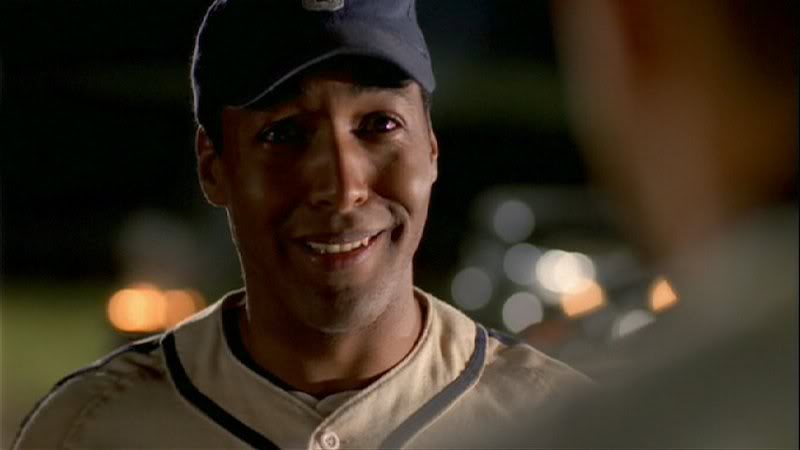
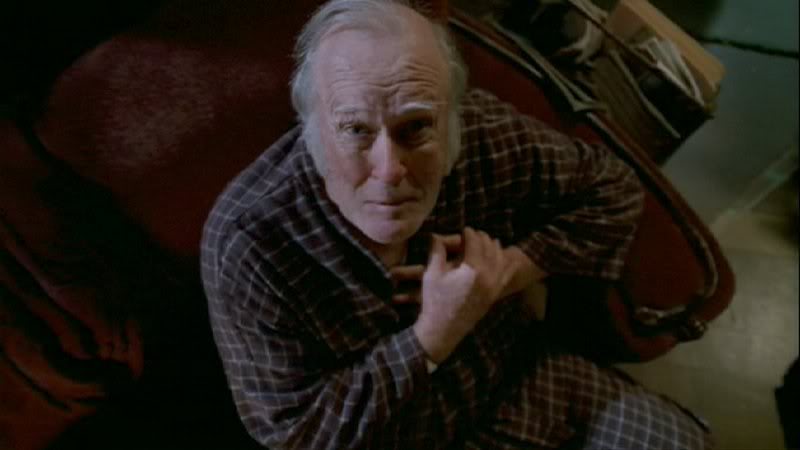
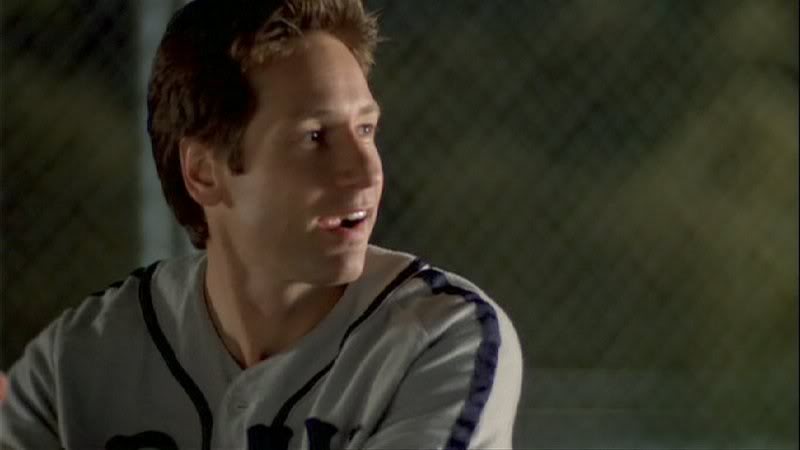
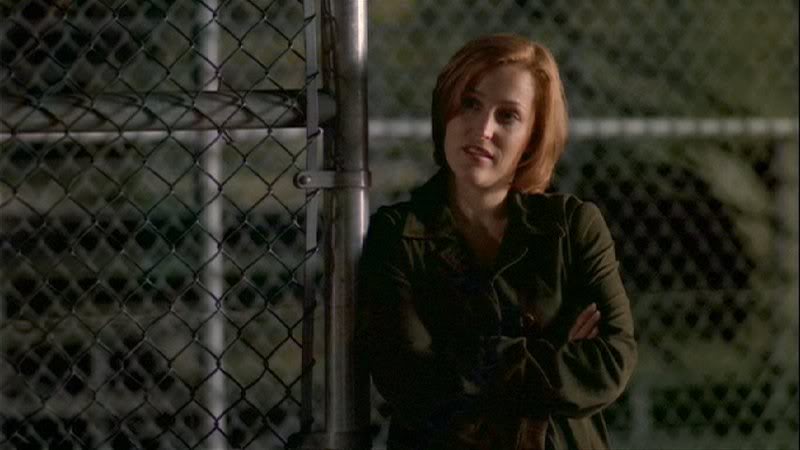
-- Although the show's writing staff had urged Duchovny to end the episode with the dissolve from the ballfield where Dales holds the dying Exley back to Mulder and Dales in present day, Duchovny resisted taking out his epilogue with Mulder and Scully. "It was very important that there be something like an old-fashioned moral. The whole story was about how it affected Mulder and Scully. What did we learn? It was really important to me that Mulder and Scully have communication on this issue, but that it not be literal. And it was important that the audience realize Mulder had called Scully up to the ballfield because he learned something about life. I wanted him to impart it to Scully without telling her what it was. At first he was going to tell her, but the last line belonged to Scully, who said, 'Shut up, I'm playing baseball.' As usual, Scully got it, and told him to shut up. Here's Mulder, he's learned this big lesson, he's going to tell Scully all about it, and she just intuitively grasps it and tells him to shut up because she's playing. What he's supposed to have learned is the value of just loving the game."
-- Mulder, by sharing his knowledge with Scully, is a contrast to Dales, who keeps to his apartment and doesn't want to let the world in (including Mulder, who is granted entrance only after passing a baseball pop quiz). However, that kind of contrast doesn't fascinate Duchovny so much as who the characters are and how they react. "That stuff is not so important to me. I don't think of Mulder as a character. I think of him as an opportunity to tell a story. I don't really believe in character -- I believe in situations. I believe people's character comes out of their responses to situations, but I don't believe that that character exists before the situation exists. As a writer, I think all that stuff about character is bullshit. Screenwriting is storytelling; you put a figure in a story and have him react the way you want to tell your story. When people get outraged and say, 'Oh, Mulder would never do that!' Well, yeah, he would, it's written right here. I've got it in writing. Look: Mulder wears a dress. Says right here that he would do that. But people don't get that. Read Mamet on character; he's very smart on that."
-- "It was great to direct Gillian," Duchovny said. "She only had two scenes, so it wasn't a lot, but I think they were nice scenes for her. In the course of a series like ours, a lot of time the scenes are written away from you. Scenes are written to the plot or to the guest stars that have to be established so that their story can run its course. And I think what I did was write two scenes that were interesting for the Scully character. When that happens for an actor, any actor, they come alive. So yes, I think she listened."
-- Box Scores = The Pythagorean Theorem for Jocks. For the non-Math Geeks, the Pythagorean Theorem asserts that for a right triangle, the square of the hypotenuse is equal to the sum of the squares of the other two sides.
-- As it faded from past to present, the episode included a tribute to The Yankee Clipper, Joe DiMaggio, who passed away a month or so before this episode aired.
-- The episode also included a clever use of a clip from "Colony" (also a DD inspired story where we first met the Alien Bounty Hunter) to take viewers back to the past.
-- When Exley realized that the Bounty Hunter was on his trail, instead of fleeing, he stopped and played one more game. "He knew he was found out and they were going to come and take him away. He wanted to set his record, he wanted his one last chance to be remembered by the game," Duchovny said. What set Exley the alien apart from his fellow aliens was his love of humanity, symbolized in the joy of the game of baseball, but also in other human pleasures such as laughter and song. For Duchovny, Exley -- who at the end truly became human and bled red blood, instead of alien green -- was a Pinocchio figure. "He lived the fantasy not just of wooden boys, but of all men and women. You want something to make you real -- authentic. Exley became real. I spared you the dialogue where he could have said, 'I feel real,' but you get to see it [when he bleeds]. The beauty of movies is that you can actually show things instead of telling them. You can have a very tidy -- as my former teacher Harold Bloom would say -- 'trope' of humanity: 'Oh my god! You've become a real person out of your love of the game!' I'm being ironic but this is moving to me and it meant a lot to me. If I were to sit down and look at that hour of television, I would say it has more of me than anything else I've ever done."
-- As director, Duchovny had first cut of the episode, so for the first time he found himself working in the editing room. His editor for "The Unnatural" was Lynne Willingham. Duchovny found the experience greatly rewarding. "It's fun if you have enough footage to make your show make sense," he said. "I think I did pretty well in getting footage. We often start to shoot scripts that are still in progress -- that's just the nature of the schedule -- but I had my script far in advance because I was only doing one, so I was prepared months before and I knew what I needed. Lynne [who began editing while shooting was still in progress] would call me if I missed anything, so I had the chance to go back and get something. When you're out there shooting, you really do have an infinite amount of possibility for where you're going to put the camera. The great thing about the editing room was that for better or for worse, once you're in it, you only have the shots you took, and you have to make it work from that. There's less panic in editing, because even though you're dealing with something diminished, something no longer infinite, at the same time you're dealing with something concrete, and you've got to make it work. It's kind of like growing up. You're like, 'Okay, well, f---, I'm not going to be an astronaut, let's just learn how to fly a plane.' "
-- The editing process did not see any major changes from the final script, although Duchovny remembered one alteration suggested by X-Files writer/producer John Shiban that helped clarify the story. Shiban suggested that Duchovny add a fourth-act recap of the teaser, right before the episode advanced beyond the teaser's attack on the ballplayers by the horsemen. "I had written it so that you go back just to the point where you left it off, to the unmasking of the alien, and John and some of the producers felt that the audience needed a reminder about what was going on. I thought that was a really good editorial decision." Duchovny's favorite post-production experience was working with X-Files composer Mark Snow, who had composed and performed the music to every episode. "I talked to Mark about the feeling that I wanted, which was this Ry Cooder-guitar, Paris, Texas sound. I just loved the music in the beginning of the episode."
-- The music was also a little higher-budget than usual: Mark Snow's twangy, Ry Cooder-esque score for "The Unnatural," was the first X-Files score in the series' entire history to be recorded with actual musicians, rather than synthesizers. The two musicians involved were virtuoso slide guitar player Nick Kirgo (a cousin of Mark Snow and a friend of David Duchovny) and legendary harmonica player Tommy Morgan (who performed the harmonica solo on the theme song of the movie Midnight Cowboy.
-- FYI: Larry Doby became the first African-American player in the American League, playing his first game for the Cleveland Indians on July 4, 1947, 11 weeks after Jackie Robinson broke the Major League color barrier with the National League's Brooklyn Dodgers (and two days after Exley's passing, according to the date stamp in the teaser).
-- In comparing his first two writing/directing assignments on The X-Files, Duchovny noted that "The Unnatural" and "Hollywood A.D." shared a similar narrative structure, and both ended with Mulder and Scully together, sharing information (non-verbally in "The Unnatural," with dialogue in "Hollywood A.D.") about what they witnessed and what it meant. Duchovny felt that despite the similar structure, each episode's conclusion showed Mulder and Scully in a different light. "They were two separate stories that dictated to me how they should end," he said. "They were slightly different in that 'Hollywood A.D.' ended on its own [with the zombie dance] and 'The Unnatural' ended with Mulder and Scully. 'The Unnatural' was more integrated into the frame of the characters in the show. 'Hollywood A.D.' was more of a release and happened behind their backs; they summed up the story in the way they think it was, and then the story summed up itself with the way it was. In 'The Unnatural,' it was Mulder and Scully who sum up the story the way it was. They got it. In 'Hollywood A.D.' they think they got it, but then it goes one more step. Mulder and Scully got what they needed to get, but they still underestimated the power of Hollywood. Of course, they would, because they didn't really care about it. They got what they needed to get, and whoever got to tell the story won. They got to tell the story; they got to remain true to their own version of what this life was. 'We can't let this bother us, let's go out and have fun. We know what we do, we know who we are, it doesn't matter what anybody else thinks.'"
(The Holy Flaming-est Cow Moment in the Entire Series - IMBO)
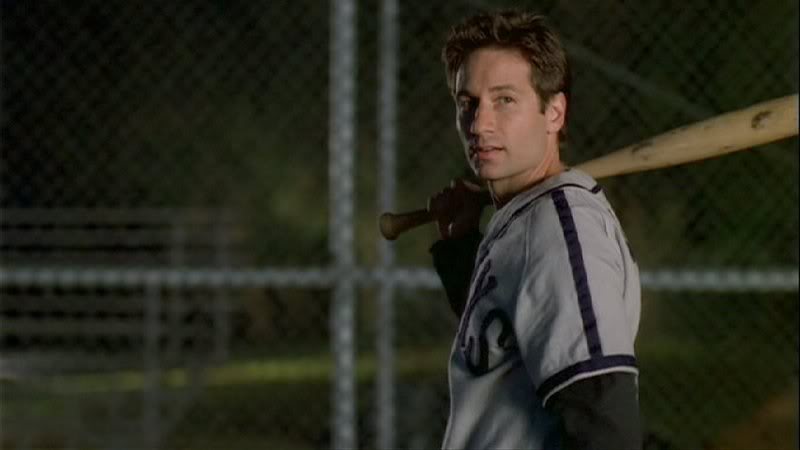
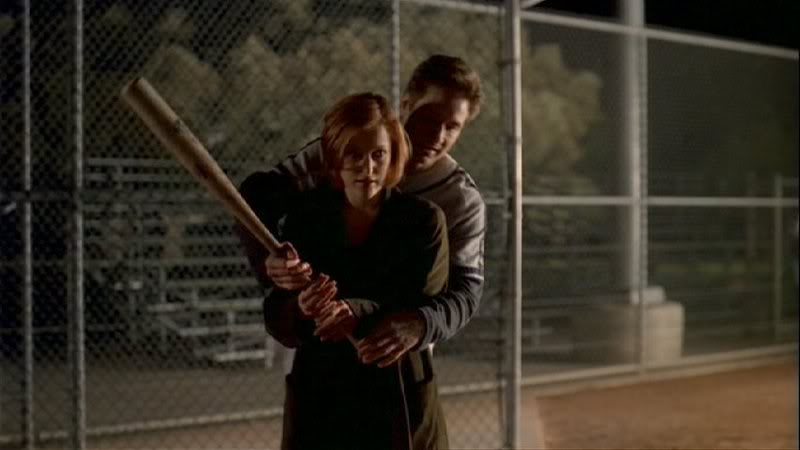
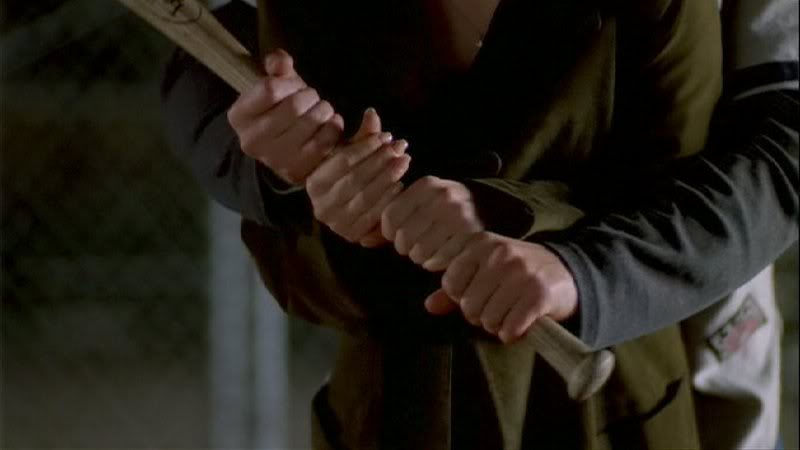
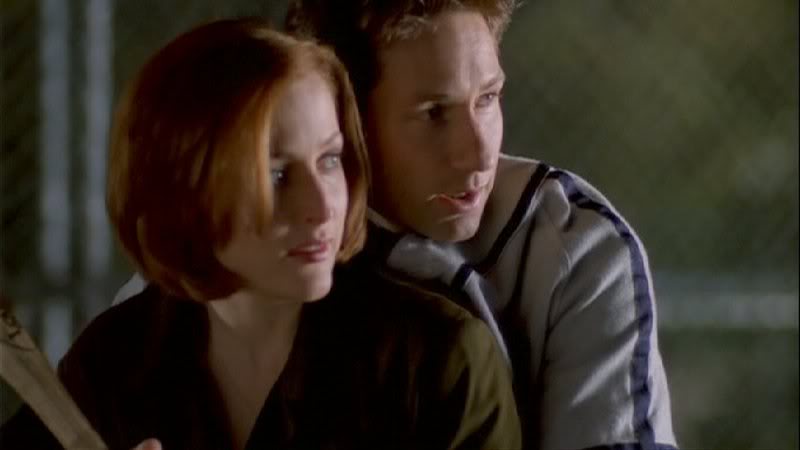
-- "I actually met David the first day of rehearsal when we did the read through," said Jesse L. Martin. "But apparently he'd seen me on Ally McBeal and he'd known of me from Rent. He just decided I was perfect. I don't know how he decided that, but he did. Thank God he did because I had a great time. It was like going to summer camp. Of course, it wasn't very warm. We were going night shoots mostly and we were in the middle of the desert. It was so much fun. David was really, really great with actors. Being an actor himself, he understood what actors needed to hear. He sort of let you find things yourself. I thought he was really, really generous that way."
-- Duchovny was also generous in other ways. "David actually gave me his coat one night when it was really cold," Martin said. "I was standing there trying to act cool, trying to be macho and not shiver, but I was shivering badly and he gave me his coat. It was very nice."
-- "David was an extremely intelligent person. He knows how to inspire you," said Martin about being directed by Duchovny. "Every day on set, I was kind of giggling. 'Wow, wow, I can't believe I'm standing here talking to aliens in the desert in the middle of the night.' David left a lot up to me. There was a point in the story where my alien character Josh was asked to sing by his fellow baseball players. Initially, David wanted Josh to sound like he'd never sung before in his life. I know it sounds funny, but it was hard for me to sing poorly. I told David, 'If this alien wanted to be a singer, he'd do it well.' And he allowed me to do it."
-- Following Ally McBeal, Martin went on to the recurring role of Detective Ed Green in NBC's Law and Order. He also reprised the role that made him famous on Broadway, Tom Collins, in the film version of Rent.
-- M. Emmet Walsh (old Arthur Dales) was a familiar face in films and on television for more than 30 years. His credits prior to X-Files included Little Big Man, Escape from the Planet of the Apes, The Jerk, Blade Runner, The Milagro Beanfield War, and My Best Friend's Wedding. Today, at the age of 71, he remains as busy as ever, with five films in the can to be released in 2007.
-- Daniel Ducovny, who played the bench jockey Piney, is David Duchovny's older brother.
-- Kerric Macdonald, who played Moose, was a production assistant on the show when it was based in Vancouver.
-- Lou Beatty, Jr., who played a Black Coach in the episode, worked with David Duchovny again recently. He played Marvin Beckett in the December 13 episode of Bones, "Judas on a Pole," directed by Duchovny.
-- Once & Future Retreads: Fredric Lehne (Young Arthur Dales) played the same role in "Travelers." Brian Thompson (Alien Bounty Hunter) played that role in nine other episodes. Jesse L. Martin (Josh Exley) had an uncredited role as a Guard in "Irresistible."
-- "The Unnatural" was the 20th episode on the season filmed, but it aired before the 19th episode filmed, "Three of a Kind," which was Mulder-less to give Duchovny the time he needed for pre-production of "The Unnatural." "The Unnatural" also benefited the "ship" by airing right after "Milagro."
-- Duchovny admitted that as a director, he has his weaknesses, especially in his ability to conceive a shot visually. "I'm spatially backwards. I have no competence at all. I can't draw. I can't even conceive on a flat piece of paper in three dimensions. I wish I could. So I was really nervous going in thinking how am I going to move these people through three dimensional space? I also always feel nervous that I'm not always getting enough pieces to cut it together. What I do have is a kind of non-linear sense of how images reveal a story. I guess in 'The Unnatural' it would be the moment when Exley bleeds red blood, and in 'Hollywood A.D.' it's the final moment when a piece of plastic makes zombies dance on a sound stage. When someone would say, 'This doesn't make any sense. Why is this here?' I would say, 'Because.' It makes poetic sense and I think that when you tell a story visually you're telling it poetically. You're not telling it like a literal narrative. I feel very comfortable creating an image that is poetic. I feel very uncomfortable in those three dimensions. That just comes with experience, that you go, 'Okay, that's how everything cuts together.' I think I was more comfortable the second time around with 'Hollywood A.D.'"
-- Although "The Unnatural" was his first directing assignment, Duchovny felt he did not receive any help beyond what is usually given any new director on the series. "Traditionally, as a standard operating procedure, TV producers will let long-time actor on a series direct, but it's letting a monkey paint," Duchovny laughed. "The idea is, 'Oh, we've got this mechanism of The X-Files in place and we won't let you fail,' which is encouraging, if also condescending. When you actually go through it, you realize both that you can do it, and secondly, that you do need a lot of help. Everybody who comes in to direct gets a lot of help, not just dumb actors who think they can direct. Every director who goes in there has the benefit of a great director of photography, a great script supervisor, and actors who have been doing their roles for years. But I got no more help than anybody else. The illusion is that you have these directors who come in and run the ship, but the ship runs itself and the ship knows where to go. That comes from people like the director of photography, Bill Roe, who's so important, and the set designer, Corey Kaplan, who's phenomenal; in "The Unnatural," which is a period piece, it was just perfect to have that baseball field and that old bus. I don't know the uniforms, any of those things. I just went, 'Okay, I want to set it in the 1940s,' and then everybody else helped me out."
-- "Kim Manners and Rob Bowman helped me a lot," Duchovny said. "My first assistant director, Barry Thomas, held my hand and sat up till three in the morning making up shot lists with me so I wouldn't feel naked going in there. Michael Watkins, who is a director and was a producer at the time of 'The Unnatural,' was there all the time. So it was really Michael and Kim on the first one and then Rob and Kim on 'Hollywood A.D.' I storyboarded everything with Alex Hill, who is fantastic. Then I'd bring my storyboards to Kim and I'd say, 'Do you think this is going to work?' and that's the kind of help I got."
-- Propelled by their love of the game and/or for David Duchovny, just about everybody involved in "The Unnatural" seemed to have gone out of his or her way to help out or to offer praise.
-- Said Chris Carter, "I think that David, a person who has a very intimate understanding of the show, made the best of his opportunity to tell a very different kind of X-File and expand the elastic show that it is."
-- Said Gillian Anderson, "I was proud of David for writing the script. I thought it was wonderful. As a director, he wanted to learn and he was very enthusiastic about learning the details of the process. He was kind and gentle and respectful and humble, and always tried to do his best. He was very calm and you wouldn't have known that it was his first directing job."
-- Duchovny was particularly proud that Bill Roe was nominated for an Emmy Award for Outstanding Cinematography for a Series for "The Unnatural."
-- "The Unnatural" was an instant hit with X-Files fans, some of whom compared the episode's visual puns and occasionally mocking tone (particularly when Arthur Dales was on screen) with episodes by former writer Darin Morgan, the show's self-referential humorist par excellence. Duchovny claimed that Morgan wasn't as big an influence as one might think, although he greatly admired Morgan's work for the show. "Darin comes much more out of the history of film," Duchovny commented. "He's seen everything. I come more out of literature. In that way we're very different, but I do think we are both kind of hell-bent on subverting the seriousness of the show. Glen Morgan and James Wong opened the door to deflation of the show's archness, and then Darin kind of destroyed the show from within. I was a real fan of that, so Darin paved the way for this kind of tone."
-- "My position on the show was that humor could work on it," Duchovny added. "Not necessarily that it was supposed to be a funny show, but that humor was an indispensable part of the character and therefore, of the show -- Scully not being a barrel of laughs and all," he joked.
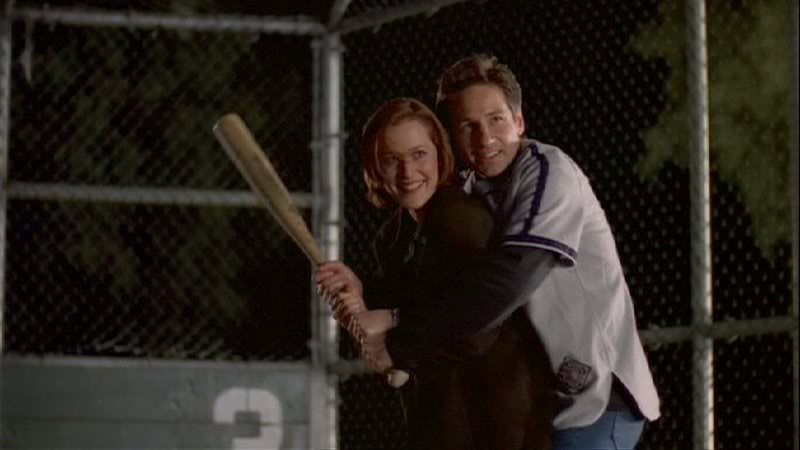
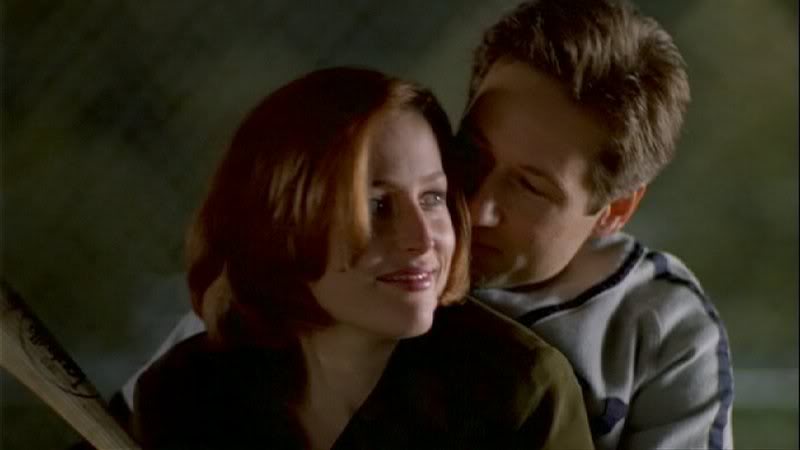


-- "I thought Mulder was the way that humor was going to enter into the show," he continued. "And then we had Morgan and Wong, and Darin Morgan, and we still had Vince Gilligan and Jeffrey Bell who were able to hold both a humorous, whimsical element and a scary, supernatural element. And I think that those shows were really successful. And when they fall flat, they fall flat because they're too whimsical or they're trying too hard to be funny. But in Season 6 there were four or five whimsical or funny episodes in a row and some fans complained. It didn't come down from on high, it just sort of happened. It didn't have anything to do with the move to L.A. I think most likely it had something to do with being in the sixth year of the show. You become self-referential. You start to wink at the audience, in some way, just because you have a history with the audience. People got scared because all those episodes happened to occur in one spate and they went 'Oh my God, it's Ally McBeal!' But it never was and was never meant to be. The show is hard to write, and when the writers have an idea, they just thank the Lord. They don't say, 'But could you send me one that's less whimsical?' They are just thankful that they've got an X-File idea that will work and they can write. Yes, I thought 'The Unnatural' was whimsical. But I also thought it was very emotional and very serious on, what to me was an allegorical and meaningful level. So I think when The X-Files functions at its best, it functions on all those levels, and isn't just scary or just whimsical or just conspiratorial. At its best, it was the most intricate show out there and worked on all levels. And when it didn't, it didn't."
-- When asked what he learned during his first experience as a director, Duchovny answered, "I will not be late to the set anymore, because that really screws up a director. You're pushing so hard to make your day, and to get all the work done. If an actor is talking on the phone in his trailer for five or ten minutes it really screws you up -- so I will not be that actor anymore. When you're an actor, the day takes forever. When you're a director, it takes one second."
-- "It was pretty nerve-wracking, but in the end I have to say everything worked out pretty well," Duchovny said about his first directing job. "It was like an all-encompassing focus that you needed to have for a month and then it was still going on. Each stage of post-production was just as consuming and you didn't want to let any little detail get away from you at that point. It didn't really end until the show went to air."
-- "The Unnatural" garnered rave reviews from critics as well as fans. The New York Daily News gave the episode four stars and noted, "If more of this season's X-Files episodes were like 'The Unnatural,' nobody would be saying that the six-year-old series has outlived its vitality. Indeed, Sunday's episode, written and directed by star David Duchovny, so ingeniously grafts classic 'X-Files' story elements and wry, self-mocking wit onto a delightfully fresh premise that it stands shoulder to shoulder with the better episodes of the series' better seasons. You can't help wondering if Duchovny has more of this terrific stuff in him and, if so, how much The X-Files would gain by figuring out how to get it out of him and onto TV screens."
-- "I don't think I could do what Rob and Kim do," Duchovny said just after "The Unnatural" aired. "Where they get a script that they may not relate to but they just shoot it anyway. I don't know if I could do that. I really liked this 'idea' that I directed, so it was easy for me to be involved. It would be harder to spend that kind of energy on something you didn't really believe in." (Of course, Duchovny recently stretched his wings by directing the first thing he wasn't completely involved in -- an episode of Bones.)
-- One day before "The Unnatural" aired, another David Duchovny production was launched -- David and wife Téa Leoni became the proud parents of their first child, Madelaine West Duchovny, born on April 24, 1999.
-- "I think becoming a father is a little like directing," Duchovny said. "In that it's terrifying -- and then you get there, and it's still terrifying, but at least you have something to do rather than worry. Before the baby comes, it's all just worry. Then when the baby's here, I actually have something to do. I take care of it, which is far better than just worrying."
-- The baseball-loving Duchovny counted Mickey Mantle and Willie Mays among his idols growing up. "Willie Mays was the best ever," he said. "When I was in college, I once made a catch like the one Mays made over his head. Sometimes, when I'm laying in bed at night, I think about it. It still makes me warm."
-- "I was a big baseball fan when I was a kid, and there was one guy, Mickey Mantle, that I probably would have melted had I ever met him, just because he meant so much to me as a kid," Duchovny said. "Sometimes I think it's better that I never met him because would he have lived up to my expectations? I think about that when fans say how excited they are to meet me. Do I live up to their expectations? The work stands on its own, but when you meet this person who means a lot to you, it just seems to me that it's impossible to be as good as your work or as interesting as your expression."
-- It doesn't appear that Duchovny has anything to worry about. Asked where he would be 10 years after leaving the show, he replied, "I'll be playing a game of catch with my son ... or my daughter. She can play sports too. That's what I'll be doing -- playing a game of catch."
-- I've always thought this would make a great XF trivia question: In which episodes (other than "The Unnatural") has Mulder mentioned something about baseball or used a baseball analogy? Let's see ... I can think of "Home" (his "eau de ball" speech), "Blood" ("I played right field"), "The Red & the Black" ("how to throw a curve ball"), "Amor Fati" (victory cap, tie goes to the runner), "Redux II" ("how 'bout those Yankees"), "Never Again" ("having an NY tattooed on my ass"), "Hollywood AD" (Willie Mays), and "Vienen" ("tell the kid I went down swinging"). Can you think of any others? I can only think of one for Scully, but it was a good one: The Goldberg Variation ("I like baseball too." Wonder why? < veg >).

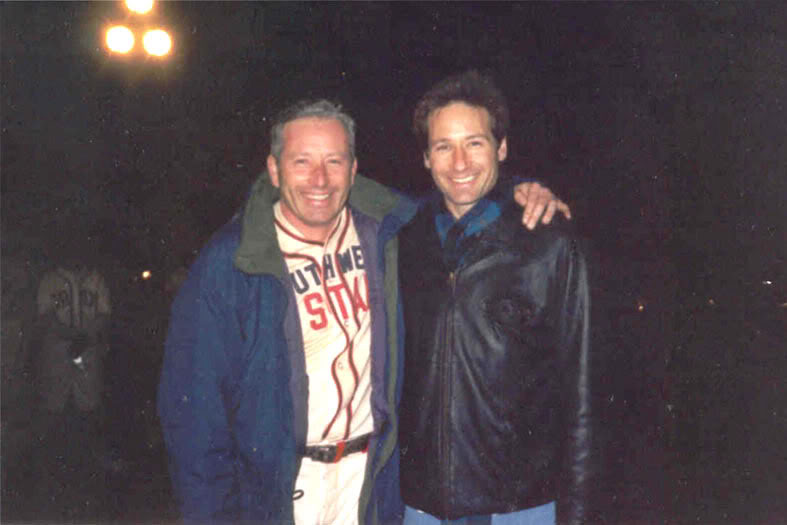
(Thanks to chrisnu and about dd for today's pics.)
-- Memorable lines, great gag reel fodder, sweet, sexy, and a lovely fable. Beautiful bookends, and what's in the middle ain't too shabby either. I'm sure not everyone loves "The Unnatural" as much as I do, but I think with this one, Duchovny hit it out of the park.
Whew! Possibly the longest Ep of the Day write-up we've had -- but well worth it. And that finishes up our CTP remembrances for Season 6!
Please share your first impressions, favorite (or cringe-worthy) moments, classic lines, favorite fanfic, nagging questions, repeated viewing observations, etc., as today we celebrate "The Unnatural."
Polly